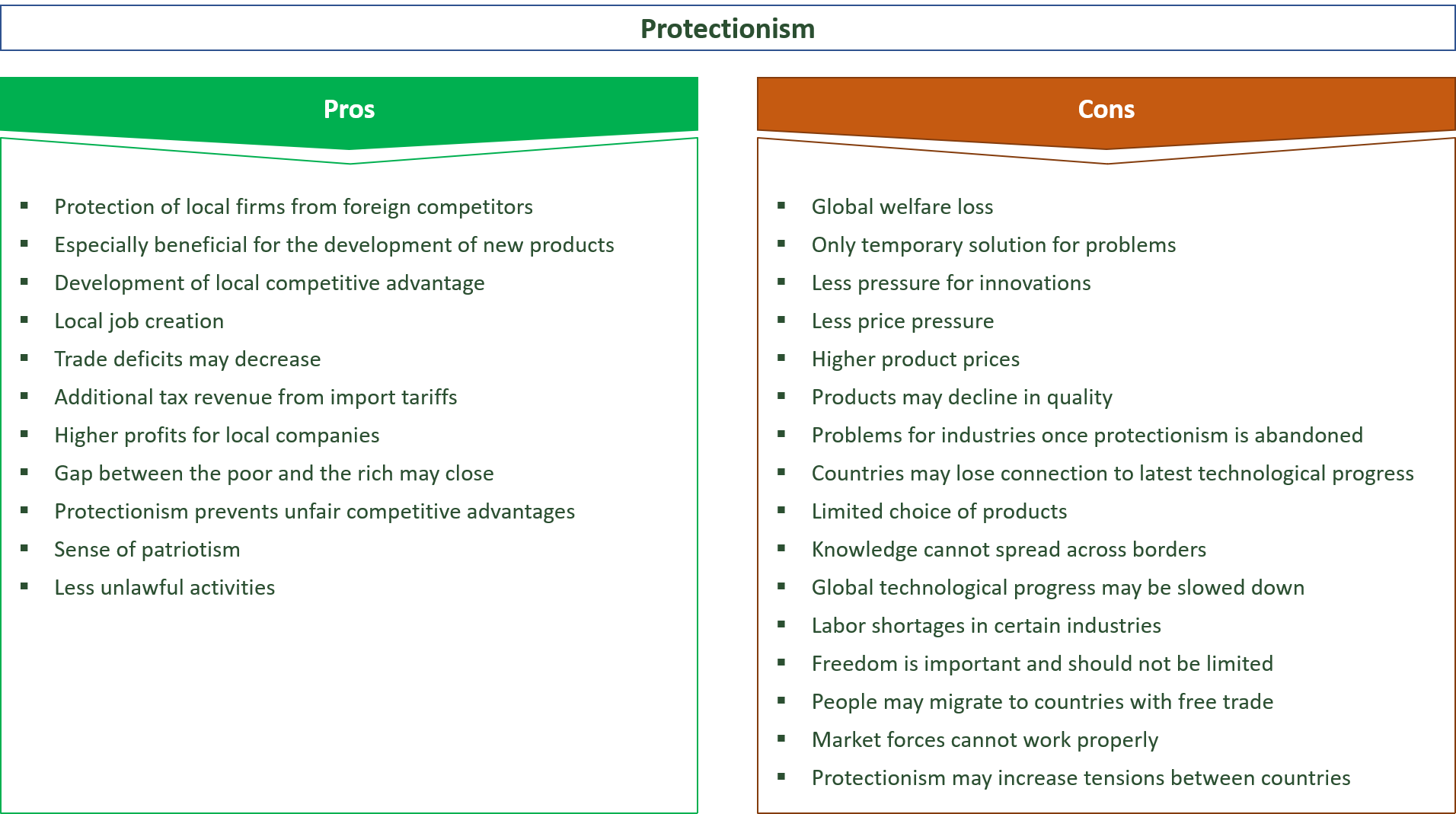” Protectionism will do little to create jobs and if foreigners retaliate, we will surely lose jobs.”
Alan Greenspan, Economist
Pros and Cons of Protectionism vs. Free Trade

Protectionism can be defined as an economic policy that aims to protect the local economy from imports from other countries.
This can come in the form of tariffs like high taxes for imports so that it will become less attractive to buy goods from overseas.
It can also come in the form of quotas so that the number of goods that can be imported is limited by the government.
Protectionism has been practiced over centuries by a variety of different countries.
Even though it has some advantages, protectionism also implies many serious problems.
In this blog post, the pros and cons of protectionism are examined in detail.
Audio Lesson
Contents
Advantages of Protectionism
- Protection of local firms from foreign competitors
- Especially beneficial for the development of new products
- Development of local competitive advantage
- Local job creation
- Trade deficits may decrease
- Additional tax revenue from import tariffs
- Higher profits for local companies
- Gap between the poor and the rich may close
- Protectionism prevents unfair competitive advantages
- Sense of patriotism
- Less unlawful activities
Protection of local firms from foreign competitors
One important advantage of protectionism is that it gives local firms significant protection from foreign competitors.
For instance, if there are high tariffs on products from foreign producers, prices will be quite high for those products and customers will likely refrain from buying those items.
They will rather buy cheaper alternative from domestic producers, which strengthens the market position of local firms.
Thus, especially for local firms who would not be able to compete against big firms on a global scale, protectionism might be an important tool so that they can continue their operations.
Especially beneficial for the development of new products
Since companies are protected against losing market shares to global competitors through protectionism, those local companies will now be more willing to spend money on research and development since their upfront investment is more likely to pay off in the long run.
Thus, it is more likely that new products and technologies are invented for the local market and that firms will get a kind of first-mover advantage since they do not have to fear that global competitors will steal their ideas.
Development of local competitive advantage
Protectionism may also provide the local economy with a kind of competitive advantage.
Since prices for local products will be much cheaper compared to prices for products from foreign countries, chances are that consumers will mainly buy local goods and the global competition might stop offering their products at one point in time.
Thus, if this happens, local firms may be able to conquer the whole local market, which may significantly increase their market position and their level of competitiveness in the long run.
Local job creation
Through import tariffs and other protective measures, it is also more likely that there will be more local jobs in the long run.
Since companies are protected against global competition, their market position tends to improve and they might be willing to create new jobs due to their increasing market share.
Thus, especially for regions that suffer from high unemployment rates, protectionism may be a great tool to lower this number and to increase the living standard of many people in those regions.
Trade deficits may decrease
By engaging in global free trade, some countries have huge trade deficits and the national debt increase drastically due to that.
However, by introducing protective measures like tariffs or quotas, the trade deficit will likely decline since countries will import fewer goods from other countries and focus on the development of the local market instead.
Therefore, protectionism may also lead to a decrease in government debt and trade deficits, which may be beneficial for those countries in the long run.
Additional tax revenue from import tariffs
Countries that engage in protectionism may also benefit from significant additional tax revenue from tariffs on foreign goods.
This additional money can be used for important infrastructure projects or for other things that improve the living conditions of locals.
It can also be used for further strengthening the local economy in order to ensure long-term success.
Higher profits for local companies
Since there will be less global competition through protectionism, local companies may also be able to significantly increase their profits.
Even though this will be rather bad for consumers since they have to pay higher prices, it will greatly benefit local companies since they can strengthen their market position and also make higher profits.
In turn, governments will also be able to profit from higher corporate tax revenue.
Gap between the poor and the rich may close
Free trade also tends to widen the gap between the poor and the rich since capital is often invested in foreign countries and doesn’t benefit the local economy too much.
Moreover, multi-national companies often try to avoid taxes whenever possible and will often pay almost no corporate taxes at all.
Through protectionism, more money will stay inside the country, which tends to benefit the local economy and the local development of a region.
Additionally, companies may have to pay higher taxes, which also benefits the general public since more money can be used for important infrastructure projects.
Protectionism prevents unfair competitive advantages
In some countries like China, wages are generally much lower compared to high-wage countries like the US.
Thus, products can be produced much cheaper, which gives those low-wage countries an important competitive advantage since they can offer their products much cheaper on the global market.
However, in order to prevent unfair competitive advantages for those low-wage countries, protectionism could be an effective countermeasure since through tariffs, products from those low-wage countries will become more expensive and consumers will be less likely to buy those products and may be more likely to buy products from local manufacturers instead.
Sense of patriotism
Through protectionism, the local economy will be strengthened and unemployment rates may decrease in the short run.
This may give locals a sense of patriotism since they may feel as a valid part of society and do not have to fear to get unemployed due to fierce global competition.
Thus, the sense of community inside countries may increase due to protectionism.
Less unlawful activities
Free trade made the world much more open since large amounts of goods can be shipped all over the world on a daily basis.
However, this also implies that criminals may use those open markets for their purposes and illegal substances and other unwanted goods may be able to reach several countries all over the world.
Through protectionism, country borders would be better secured and the chances for unlawful activities may decline.

Disadvantages of Protectionism
- Global welfare loss
- Only temporary solution for problems
- Less pressure for innovations
- Less price pressure
- Higher product prices
- Products may decline in quality
- Problems for industries once protectionism is abandoned
- Countries may lose connection to latest technological progress
- Limited choice of products
- Knowledge cannot spread across borders
- Global technological progress may be slowed down
- Labor shortages in certain industries
- Freedom is important and should not be limited
- People may migrate to countries with free trade
- International investors may refrain from investing in those countries
- Market forces cannot work properly
- Protectionism may increase tensions between countries
Global welfare loss
Although we have seen in the previous analysis that protectionism can have many important advantages, it also has serious downsides.
One problem of protectionism is that it also implies a global welfare loss.
Since companies from foreign countries are not able to offer their products at a low price like they usually would without protective measures, consumers can not profit from those low product prices.
On a global scale, this implies serious welfare losses since companies cannot supply customers with products for the lowest prices possible.
Only temporary solution for problems
Protectionism can benefit local economies in the short run.
However, in the long run, history has shown that countries that engage in protectionism may not develop as well compared to countries that have free trade policies.
This is quite logical since international trade provides many opportunities for companies as well as consumers and will be the way to go in the long run for every country that wants to become or stay successful in the future.
Less pressure for innovations
Protectionism also lowers the pressure for innovations since local companies are protected against foreign competition and do not have to fear superior products entering the market due to that.
Thus, their incentive to drive innovations might be quite low and they may rather rely on their old proven products instead of inventing new ones.
Less price pressure
Another downside of protectionism is that it vastly decreases the price pressure on companies.
Since there is less competition, companies are able to charge higher product prices.
In turn, this means that customers have to pay these higher prices and will be able to afford fewer products, which may also imply a significant welfare loss for the local population.
Higher product prices
Due to the lower level of competition and higher product prices for products from local companies, one might say that consumers could switch to products that are manufactured in foreign countries.
However, those products have become quite expensive through the introduction of tariffs and will not be much cheaper compared to the local products in many cases.
Thus, through protectionism, the overall price levels may increase significantly and consumers will often not be able to do anything about it since both the local as well as foreign products will become more expensive.
Products may decline in quality
Since there is less need for innovations and also the overall level of competition is decreased through protectionism, the quality of products may also suffer since local producers will not have to take efforts to assure high product qualities since there will often be simply no other company which provides better products.
Thus, protectionism might also hurt the overall quality of products.
Problems for industries once protectionism is abandoned
Since protectionism can often not be sustained in the long run, once it is abandoned, companies who previously operated in this protected economic environment will now compete with global brands and may likely not be able to stay in business in this fierce competitive environment in the long run.
Thus, governments around the world should consider this problem before introducing protective measures in the first place.
Countries may lose connection to latest technological progress
It may also be hard for companies and whole industries to keep up with the latest technological progress since through protectionism, access to the latest research findings may be limited and also the sharing of new ideas may be quite limited.
Thus, countries that engage in protectionism may lose connection to the latest technological progress, which may threaten the competitiveness of those companies in the long run.
Limited choice of products
Protectionism also implies a limited choice of products for customers.
For instance, if you go to a store, you are used to a big variety of products.
Even though you might take all of this for granted if you live in a country that promotes free trade, you might not have this variety of products in countries that have strict protective regimes since certain products may be restricted with quotas and the variety regarding those products may be quite limited.
Knowledge cannot spread across borders
Knowledge is key in order to progress as a nation.
Most of our latest technologies are invented by teams of talented international researchers who collaborate and make exciting things happen.
However, if a country decides that it wants to engage in protectionism, chances are that researchers in those countries will no longer be able to collaborate with other foreign researchers and the spread of knowledge across borders may be quite limited.
Global technological progress may be slowed down
Since there is a border for the spread of knowledge and research findings across borders through protectionism, also the overall global technological progress may be slowed down.
In turn, billions of people all over the world may suffer from this since we as humanity urgently need technologies that are suitable to solve our environmental problems.
Labor shortages in certain industries
Some industry branches heavily rely on the knowledge and the workforce from people in foreign countries.
Thus, in certain industries, there may be significant labor shortages through the introduction of protective measures and companies that are affected by those labor shortages may lose their competitive edge or may even be forced to go out of business in the long run if they are not able to get access to enough qualified workers.
Freedom is important and should not be limited
Freedom is quite an important good and it took as many centuries to reach the level of freedom we have today.
Thus, everything that limits our global level of freedom should be evaluated quite critically.
Protectionism also confines our overall level of freedom since it lowers product choices for customers and it also hurts international companies.
Therefore, also from a freedom perspective, protectionism can be considered to be not the right way to go.
People may migrate to countries with free trade
Since the variety of consumer products and other services may be rather limited in countries that engage in strict protectionism, many people may want to leave those countries.
This may be especially true for highly skilled workers who rather want to live their lives in countries which have a more open attitude.
Thus, protectionism may also lead to a state where highly educated people may leave a country, which may significantly hurt the local economy in the long run.
International investors may refrain from investing in those countries
Also for international investors, it is hard to invest in countries that engage in strict protectionism since they may feel that there are too many insecurities related to such an investment.
Therefore, those investors might seek other investment opportunities instead, which may result in too low investment levels in protective countries in the long run.
In turn, this may also lead to adverse effects for the local economy since investments and economic development are closely related.
Market forces cannot work properly
In general, through protectionism, natural market forces will no longer work properly since the prices for foreign products are greatly artificially increased.
Thus, supply and demand will no longer be the driving force behind price determination.
In turn, the overall global welfare will decrease and protective countries may suffer from significant economic damage in the long run since they will sooner or later lose their competitiveness once they have to abandon their protective scheme.
Protectionism may increase tensions between countries
Protectionism does not only have significant economic effects, it may also increase the tension between countries.
The overall relations between countries may become much worse if one country decides to apply protective measures to its economy.
In the worst case, this may result in serious conflicts, which may hurt millions of people on a global scale.

Top 10 Protectionism Pros & Cons – Summary List
| Protectionism Pros | Protectionism Cons |
|---|---|
| Protection of the local economy | Welfare loss on a global scale |
| Better market position for local firms | Less trade |
| Local competitive advantage | Fewer inventions |
| Short-term job creation | Decrease in product quality |
| Development of patriotism | Labor shortages |
| Higher profits for local firms | People may leave the country |
| Less unlawful actions | Market forces are not working properly |
| Additional tax revenue | Protectionism may increase tension between countries |
| Lower trade deficits | Limited choice of products |
| Gap between the poor and rich may become smaller | Spread of knowledge may be limited |
Protectionism vs. Free Trade – Which one is better?
As we have seen, there are plenty of pros and cons of protectionism.
However, history has shown that countries that allow free trade will be more successful in the long run.
Therefore, governments all over the world should refrain from protectionism and allow free trade in order to increase and sustain high levels of welfare on a global scale.
Sources
https://en.wikipedia.org/wiki/Protectionism
https://www.investopedia.com/terms/p/protectionism.asp
https://hbr.org/1987/05/why-protectionism-doesnt-pay
https://www.britannica.com/topic/protectionism

About the author
My name is Andreas and my mission is to educate people of all ages about our environmental problems and how everyone can make a contribution to mitigate these issues.
As I went to university and got my Master’s degree in Economics, I did plenty of research in the field of Development Economics.
After finishing university, I traveled around the world. From this time on, I wanted to make a contribution to ensure a livable future for the next generations in every part of our beautiful planet.
Wanna make a contribution to save our environment? Share it!
